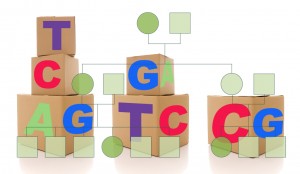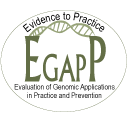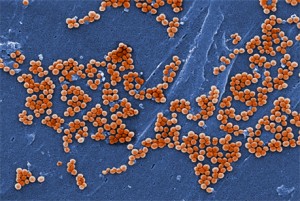Categories: evidence-based medicine, family history, genomics
September 27th, 2012 12:03 pm ET -
Katherine Kolor, Office of Public Health Genomics, Centers for Disease Control and Prevention
Muin J Khoury, Director, Office of Public Health Genomics, Centers for Disease Control and Prevention
 A new podcast from the CDC Expert Commentary Series on Medscape—Family Health History: Use It to Inform Preventive Services for Your Patients— describes how family health history can inform the delivery of preventive health services. The podcast presents three case studies based on recommendations of the US Preventive Services Task Force (USPSTF): screening for lipid disorders in adults, colorectal cancer screening, and BRCA genetic counseling and evaluation. Each case study demonstrates how family health history can be used to define a population subgroup whose increased risk could warrant more intensive preventive intervention. Family health history—which reflects the effects of genetic and environmental risk factors shared within families—has been called the “first genetic test.”
A new podcast from the CDC Expert Commentary Series on Medscape—Family Health History: Use It to Inform Preventive Services for Your Patients— describes how family health history can inform the delivery of preventive health services. The podcast presents three case studies based on recommendations of the US Preventive Services Task Force (USPSTF): screening for lipid disorders in adults, colorectal cancer screening, and BRCA genetic counseling and evaluation. Each case study demonstrates how family health history can be used to define a population subgroup whose increased risk could warrant more intensive preventive intervention. Family health history—which reflects the effects of genetic and environmental risk factors shared within families—has been called the “first genetic test.”
 Post a Comment -
Read more
Post a Comment -
Read more

Categories: evidence-based medicine, genomics
September 20th, 2012 1:12 pm ET -
W. David Dotson, Office of Public Health Genomics, Centers for Disease Control and Prevention
Michael P. Douglas, Office of Public Health Genomics, Centers for Disease Control and Prevention
 The independent EGAPP working group (EWG) held its 25th meeting on September 10-11, 2012 at the CDC campus in Atlanta. Highlights included:
The independent EGAPP working group (EWG) held its 25th meeting on September 10-11, 2012 at the CDC campus in Atlanta. Highlights included:
- Three EWG recommendation statements on the validity and utility of genetic tests are pending publication on:
- KRAS, BRAF and other markers involved in EGFR signaling, which are used to inform choice of therapies for metastatic colorectal cancer, recently submitted to Genetics in Medicine;
- Risk assessment for type 2 diabetes, in pre-submission peer-review; and
- SNP panels for prostate cancer risk assessment (based on a recently completed evidence review by investigators at the McMaster University AHRQ Evidence-based Practice Center), currently being finalized.
- The Knowledge Synthesis Center (KSC) will conduct systematic reviews on familial hypercholesterolemia and colorectal cancer screening – the latter topic is being done in conjunction with modeling by NCI/CISNET .
- The KSC is developing a manuscript for publication on methods and considerations for “binning findings from whole genome sequencing”.
 Post a Comment -
Read more
Post a Comment -
Read more

Categories: genomics
September 13th, 2012 3:00 pm ET -
Muin J Khoury, Director, Office of Public Health Genomics, Centers for Disease Control and Prevention
Katherine Kolor, Office of Public Health Genomics, Centers for Disease Control and Prevention
 Public health surveillance indicators, such as those developed for the Healthy People initiative are useful for monitoring the development of genomic medicine in the United States. For several decades, Healthy People has established health benchmarks that are considered important metrics for tracking progress in health and healthcare in the United States.
Public health surveillance indicators, such as those developed for the Healthy People initiative are useful for monitoring the development of genomic medicine in the United States. For several decades, Healthy People has established health benchmarks that are considered important metrics for tracking progress in health and healthcare in the United States.
 Post a Comment -
Read more
Post a Comment -
Read more

Categories: epidemiology, genomics, whole genome sequence
September 6th, 2012 1:00 pm ET -
Marta Gwinn, Consultant, McKing Consulting Corp, Office of Public Health Genomics, Centers for Disease Control and Prevention

Staphylococcus aureus bacteria
Late last year, Science magazine published a list of six Areas to Watch in 2012. Number 6 on the list, NASA’s Curiosity rover, recently touched down on Mars. The Higgs boson (#1) has been found, faster-than-light neutrinos (#2) have been debunked, and further developments on stem-cell metabolism (#3) and treatments for intellectual disability (#5) are in progress.
Now genomic epidemiology (#4) is approaching the public health launch pad. As Science’s editors predicted, pathogen genome sequences are being used to “determine quickly where newly emerging diseases come from, whether microbes are resistant to antibiotics, and how they are moving through a population.”
 Post a Comment -
Read more
Post a Comment -
Read more

 A new podcast from the CDC Expert Commentary Series on Medscape—Family Health History: Use It to Inform Preventive Services for Your Patients— describes how family health history can inform the delivery of preventive health services. The podcast presents three case studies based on recommendations of the US Preventive Services Task Force (USPSTF): screening for lipid disorders in adults, colorectal cancer screening, and BRCA genetic counseling and evaluation. Each case study demonstrates how family health history can be used to define a population subgroup whose increased risk could warrant more intensive preventive intervention. Family health history—which reflects the effects of genetic and environmental risk factors shared within families—has been called the “first genetic test.”
A new podcast from the CDC Expert Commentary Series on Medscape—Family Health History: Use It to Inform Preventive Services for Your Patients— describes how family health history can inform the delivery of preventive health services. The podcast presents three case studies based on recommendations of the US Preventive Services Task Force (USPSTF): screening for lipid disorders in adults, colorectal cancer screening, and BRCA genetic counseling and evaluation. Each case study demonstrates how family health history can be used to define a population subgroup whose increased risk could warrant more intensive preventive intervention. Family health history—which reflects the effects of genetic and environmental risk factors shared within families—has been called the “first genetic test.”



